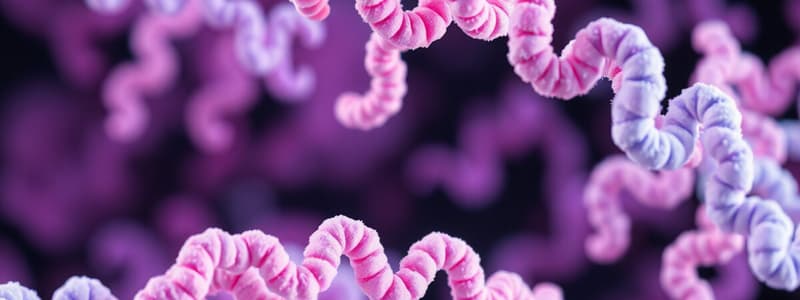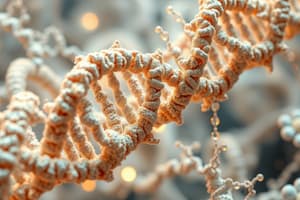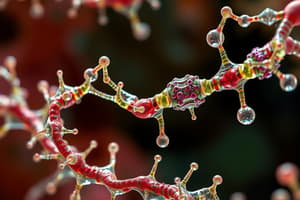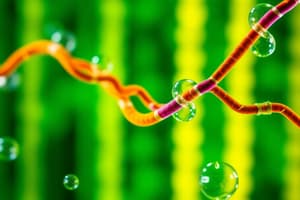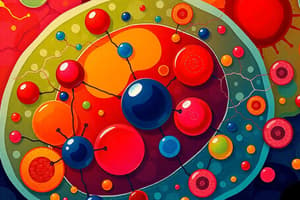Podcast
Questions and Answers
What type of metabolic pathway involves the conversion of simple precursors to complex end products?
What type of metabolic pathway involves the conversion of simple precursors to complex end products?
- Catabolic pathways
- Amphibolic pathways
- Anabolic pathways (correct)
- None of the above
Catabolic pathways are exergonic and break down complex molecules into simpler ones.
Catabolic pathways are exergonic and break down complex molecules into simpler ones.
True (A)
What is the term used for pathways that serve as a crossroads in metabolism?
What is the term used for pathways that serve as a crossroads in metabolism?
Amphibolic pathways
The process of breaking down proteins into amino acids falls under __________ pathways.
The process of breaking down proteins into amino acids falls under __________ pathways.
Match the following types of metabolic pathways with their descriptions:
Match the following types of metabolic pathways with their descriptions:
What is one main function of carbohydrates?
What is one main function of carbohydrates?
What should a student do to re-evaluate their paper?
What should a student do to re-evaluate their paper?
Lipids are primarily involved in energy storage and information storage.
Lipids are primarily involved in energy storage and information storage.
Name one function of proteins in biomacromolecules.
Name one function of proteins in biomacromolecules.
It is permissible for the professor to give additional homework for extra points.
It is permissible for the professor to give additional homework for extra points.
Nucleic acids are responsible for the storage of __________.
Nucleic acids are responsible for the storage of __________.
What is the email address of the course instructor?
What is the email address of the course instructor?
Match the following biomacromolecules with their primary functions:
Match the following biomacromolecules with their primary functions:
The passing grade for the course is ____.
The passing grade for the course is ____.
Match the questions with their respective answers:
Match the questions with their respective answers:
What approach should a student take if they need to improve their grade?
What approach should a student take if they need to improve their grade?
The professor is allowed to change the grading chart after the exams.
The professor is allowed to change the grading chart after the exams.
What type of questions will the exam contain?
What type of questions will the exam contain?
Flashcards
Metabolism
Metabolism
All the chemical reactions that occur in living organisms.
Anabolic Pathways
Anabolic Pathways
Building complex molecules from simpler ones, requiring energy.
Catabolic Pathways
Catabolic Pathways
Breaking down complex molecules into simpler ones, releasing energy.
Amphibolic Pathways
Amphibolic Pathways
Signup and view all the flashcards
Metabolic Pathways
Metabolic Pathways
Signup and view all the flashcards
Biomacromolecules
Biomacromolecules
Signup and view all the flashcards
Protein Function
Protein Function
Signup and view all the flashcards
Carbohydrate Function
Carbohydrate Function
Signup and view all the flashcards
Lipid Function
Lipid Function
Signup and view all the flashcards
Nucleic Acid Function
Nucleic Acid Function
Signup and view all the flashcards
Re-evaluation Request
Re-evaluation Request
Signup and view all the flashcards
Extra Points
Extra Points
Signup and view all the flashcards
Grading Changes
Grading Changes
Signup and view all the flashcards
Instructor Email Address
Instructor Email Address
Signup and view all the flashcards
Instructor Office Hours
Instructor Office Hours
Signup and view all the flashcards
Exam Question Types
Exam Question Types
Signup and view all the flashcards
Passing Grade
Passing Grade
Signup and view all the flashcards
Recommended Books
Recommended Books
Signup and view all the flashcards
Study Notes
Course Introduction
- Course title: Introduction to Biochemistry
- Instructor: Caner Geyik, PhD
- Email: [email protected]
- Academic year: 2024
Course Content
- Syllabus: HSF101 Syllabus 2023-2024 Spring
- Course components: Q/A section for questions and replies, netiquette guidelines emphasized
- Course materials: Syllabus details included
Course Schedule
- Week 1 (11/10/2024): Introduction to Biochemistry (Basic Principles)
- Week 2 (18/10/2024): Water, Acids-Bases, and Buffer Systems
- Week 3 (25/10/2024): Amino Acids and Protein Structure
- Week 4 (01/11/2024): Protein Classification and Function
- Week 5 (08/11/2024): Blood Proteins and Clinical Importance
- Week 6 (15/11/2024): Enzymes
- Week 7 (22/11/2024): Overview and Q/A Session
- Week 8 (23/11-01/12/2024): Midterm Exam Week
- Week 9 (06/12/2024): Carbohydrates
- Week 10 (13/12/2024): Bioenergetics and Carbohydrate Metabolism
- Week 11 (20/12/2024): Lipids
- Week 12 (27/12/2024): Metabolism of Nitrogenous Compounds
- Week 13 (03/01/2025): Signaling Pathways and Regulation of Metabolism (Fed/Hunger States)
- Week 14 (10/01/2025): Overview and Q/A Session, Final Exams
Assessment and Evaluation
- Assessment type: Pen & Paper
- Exams:
- Midterm Exam (40%)
- Final Exam (60%)
- Exam format: multiple-choice, true-false, and open-ended questions
- Alternative assessment: Specifications not provided.
Q&A
- Students can ask questions through the Q&A section, questions/answers displayed to all
- Requests for re-evaluation of grades should be submitted to faculty and using the correct form
- Additional homework not allowed for credit to improve final grade
- Professors will not directly answer questions about grades or changing the grading system
- Information about email address, office hours etc need to be found in the syllabus
- Questions about exam format should be addressed in the syllabus
Learning Outcomes
- Students will be able to describe metabolism
- Students will be able to list biomacromolecules: proteins, carbohydrates, lipids, nucleic acids
Chemistry of Living
- Topics include: molecular composition, reaction formation, regulation of metabolic reactions, energy acquisition and treatment of metabolic problems
Biochemistry Topics
- Listed in a hierarchical manner: Metabolism, Enzymology, Nutrition, Diseases, Structural Biology
Metabolic Pathways
- Anabolic pathways: simple precursors to complex products
- Glucose → Glycogen; Amino acids → Protein
- Catabolic pathways: complex molecules to simple ones
- Glycogen → Glucose; Protein → Amino acids
- Amphibolic pathways: links between anabolic and catabolic pathways (e.g., the citric acid cycle)
Biomacromolecules
- Key biomacromolecules include proteins, carbohydrates, lipids, and nucleic acids
Studying That Suits You
Use AI to generate personalized quizzes and flashcards to suit your learning preferences.
